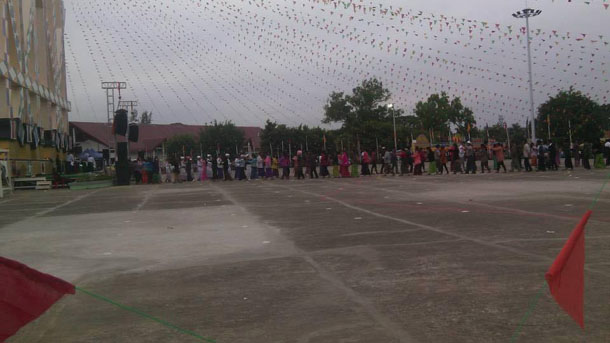CHIANG MAI, Thailand — Despite the objections of thousands of members of the local population, a prayer ceremony held to launch the first Manau festival staged inside Burma in four years has gone ahead in the Kachin State capital of Myitkyina.
About 500 people joined the ceremony on Monday, according to ethnic Kachin lawmaker Toi Bu—a subdued turnout for what had traditionally been the marquee event of the Kachin social calendar, until the festival was cancelled in late 2011 after renewed local violence.
A petition calling on the Kachin State government to cancel the festival because of ongoing hostilities between the Burma Army and local ethnic armed groups gathered more than 8,000 signatures in November. Residents of Myitkyina have also alleged that the businesspeople and politicians responsible for organizing the festival have close relationships with the Union government.
Tu Raw, an executive committee member of the Kachin Traditional Literature and Cultural Committee, said that many locals had concluded the return of the festival was premature.
“Many Kachin did not join the opening ceremony,” he told The Irrawaddy. “After we went the petition, the state government met us. They told us they would hold it. They asked us to join it. They even told us it was not possible to cancel their plans.”
“It is not the right time to hold the Manau festival. Our region does not have peace yet. There are still Kachin refugees living in camps,” he added.
Toi Bu told The Irrawaddy that while she understood local opposition to the event, she believed an official recognition of Kachin State Day on Jan. 10 was overdue and the festival would be an avenue towards constructive dialogue with the Union government.
“I support holding the Manau festival to honor Kachin State Day. By celebrating, we respect an important anniversary and we can have constructive engagement with the government,” she said. “We should think about how to cooperate and work together and good things will come.”
Speaking of a recent visit to Bahmo Township, where there have been clashes between the Burma Army and the Kachin Independence Army in recent times, Toi Bu said there was a universal yearning for peace and development in Kachin State—a sentiment which had intensified after the November shelling of a Kachin Independence Organization base near Laiza, which claimed the lives of 23 cadets.
“I found that [Bahmo] is very quiet. I spoke to the army and they said they wanted to have peace. I am sure our Kachin also want peace,” she said. “Many tourists have not dared to come to our region as they understand there is ongoing fighting. This fighting is disrupting our region’s ability to have progress. We need to have development.”
The Manau festival, held this year in conjunction with the 67th anniversary of Kachin State Day, has been staged in a variety of contexts in years gone by. Occasionally it has been held to commemorate battle victories or Kachin ethnic army procession, while a biennial festival is held among the Kachin diaspora in Thailand to mark the birthday of King Bhumibol and to thank the monarch for allowing exiles to reside in the country.
This is the first time the Kachin State government has organized the Manau festival to coincide with Kachin State Day of its own accord, said local community leaders. Previously, Manau organizers had to seek permission to hold the festival on the anniversary.
Events for the first Manau festival will continue through to Sunday, including a traditional Manau dance on Kachin State Day.

















